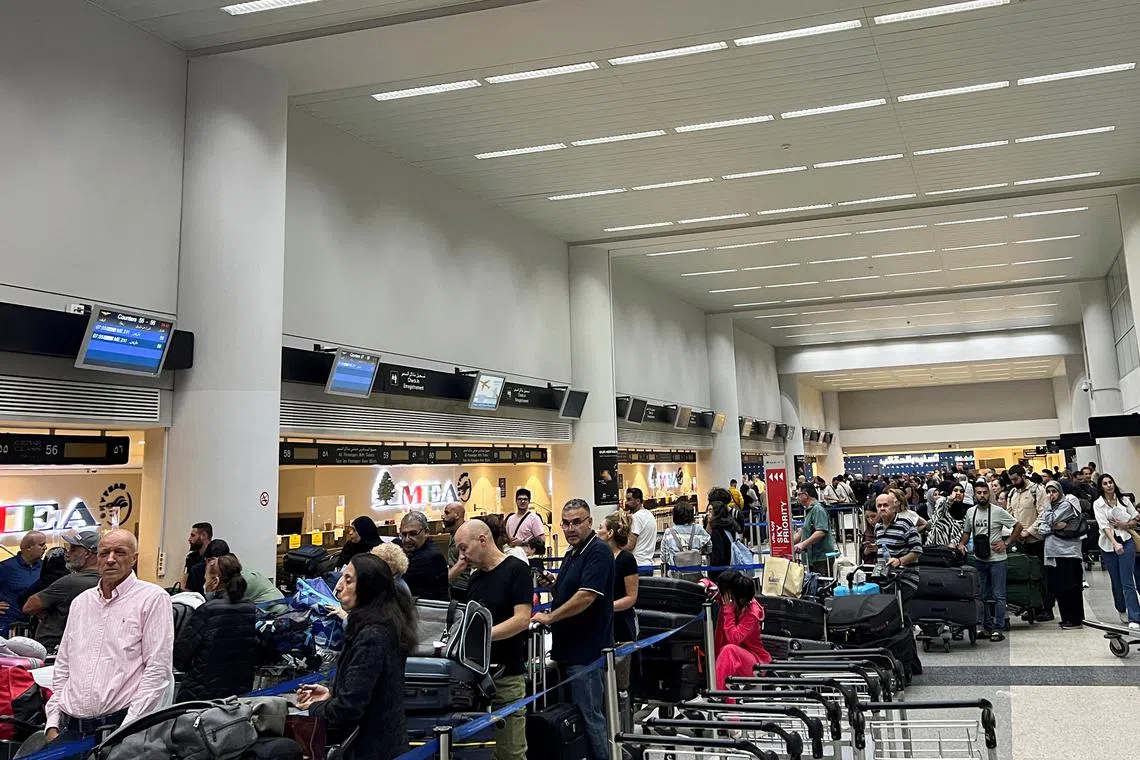Diversions, disruptions: Aviation grapples with Middle East escalation
Sign up now: Get ST's newsletters delivered to your inbox

Passengers queue at the check-in counters at Beirut's international airport.
PHOTO: REUTERS
LONDON – Rising tensions in the Middle East have created air travel chaos, with global airlines diverting or cancelling flights on Oct 2 and regional airports, including in Lebanon, Israel and Kuwait, showing long delays, according to FlightRadar24 data.
Concern over travel disruption as the conflict intensifies also knocked shares in the travel and airline sectors.
Iran launched its largest missile attack
On the morning of Oct 2, a few flights were seen over Iranian airspace, according to a FlightRadar24 map, including from carrier flydubai, after Iran said its ballistic missile attack on Israel was over.
However, flights across the entire region were diverted or disrupted with little sign of broader normalisation, with some changing their routes to avoid certain airspace.
“All planes – mainly flights to India – are avoiding Iranian airspace until further notice,” said a spokesperson for Polish flag carrier LOT.
Europe’s aviation safety regulator EASA issued two conflict zone information bulletins at the end of September advising airlines not to use Israeli or Lebanese airspace “at all flight levels”. It has not recently issued such a bulletin for Iranian airspace.
Carriers around the world have cancelled flights to Israel and Lebanon in the wake of the escalating conflict, with many saying they will not resume until at least mid-October, depending on the security situation.
Both British Airways and Air France-KLM said their flight cancellations to Tel Aviv’s Ben Gurion airport remained in place until at least early next week, including the Oct 7 first anniversary of Hamas’ attack on Israel.
British Airways, Emirates, Deutsche Lufthansa and other airlines also began diverting services away from Iraqi airspace at around 5.30pm in the UK on Oct 1 (12.30am Singapore time on Oct 2), when the Israel Defence Forces said that rockets from Iran had been fired at the country.
Many carriers shifted to flying across the breadth of Saudi Arabia and over the Sinai peninsula, based on a playback of flight paths on tracking website FlightRadar24.
On Oct 2 morning, most airlines were giving Iraqi airspace a wide berth, although some Emirates flights to the US were still overflying Iran.
Traffic over the Istanbul, Cairo and Antalya hubs remained dense, as flights continued to avoid parts of Middle Eastern airspace.
Dubai International Airport reported 85 per cent of its departing flights as delayed, while Beirut’s Rafic Hariri International Airport had 60 per cent of its flights cancelled, according to the airline tracker. At Kuwait International Airport, 67 per cent of arriving flights were delayed.
Flying more circuitous routes increases flight times and fuel expenses for airlines, and complicates schedules that depend on aircraft being in the right place at the right time.
Airlines in Europe, the US and Canada have already been contending with costly detours around banned Russian airspace on flights to Asia, which forced them to curtail services to China as their local rivals can operate shorter and more direct flights. REUTERS, BLOOMBERG


